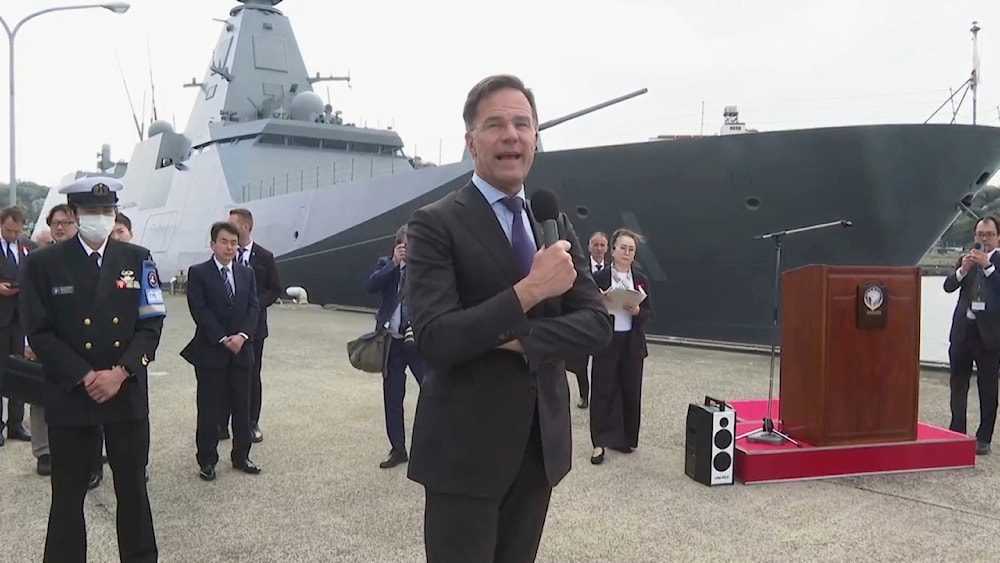NATO chief says China military expansion 'staggering'
NATO Secretary General Mark Rutte highlights China's military growth as "staggering" and calls for stronger NATO-Japan ties amid rising regional tensions.
-

In this image made from video, NATO's Secretary General Mark Rutte speaks in front of Japan Maritime Self-Defense Force's frigate Mogami during his visit to Japan's Maritime Self-Defense Force base in Yokosuka, south of Tokyo, on Tuesday, April 8, 2025. (AP)
NATO Secretary General Mark Rutte, during his visit to Japan on Tuesday, described China's military growth as "staggering," underscoring the alliance's intent to expand its presence and partnerships in the Asia-Pacific region.
"Let us not be naive about China," Rutte told the Japan Times, adding, "The build-up of their armed forces and investments in their defence industry, and in their defence capabilities, is staggering."
Rutte toured the Yokosuka naval base and a Japanese defense firm ahead of his meeting with Defense Minister Gen Nakatani, where he emphasized deeper cooperation.
"NATO and Japan share the same values, and we face many of the same challenges," Rutte told Nakatani, adding that: "China, North Korea and Russia are stepping up their military exercises and their cooperation, undermining global stability, and that means what happens in the Euro-Atlantic matters for the Indo-Pacific and vice versa."
"A stronger Japan-NATO cooperation is necessary in an increasingly dangerous world."
Nakatani agreed, noting Japan's ongoing efforts to double its defense budget in response to emerging threats.
Moreover, Rutte was due to meet Prime Minister Shigeru Ishiba on Wednesday.
China containment
The visit comes amid growing pressure from US President Donald Trump on NATO’s primarily European members to boost military spending while simultaneously urging allies in the Asia-Pacific to strengthen their defense capabilities in order to counter China and contain the Democratic People's Republic of Korea (DPRK).
In an interview with Japan Times, Rutte said, "The US wants NATO to be more involved (in the region). Not in an Article 5 sense, but in a sense of projecting power, having each other's back within NATO."
It is worth mentioning that NATO's Article 5 states that an attack on one member is considered an attack on all, obligating a collective response.
In recent years, NATO has strengthened ties with Japan, South Korea, Australia, and New Zealand—known as the IP4—whose leaders have attended recent NATO summits. NATO chief Mark Rutte told the Japan Times that the alliance aims to deepen these partnerships by expanding information-sharing and defense-industrial cooperation.
"We have to move beyond... joint declarations... let's make it practical," said the Dutchman, who became NATO chief last October.
Japan has increased military cooperation with countries in Europe, and last November, Tokyo and the European Union announced a new security and defense partnership.
US vows ‘robust’ deterrence in Taiwan Strait
On a related note, late last month, US Defense Secretary Pete Hegseth said on March 30 that the US was committed to maintaining a "robust, ready and credible deterrence" across the Taiwan Strait, describing China as "aggressive and coercive."
While speaking in Japan, Hegseth refrained from explicitly urging Tokyo to increase military spending, instead expressing confidence that the US ally would "make the correct determination of what capabilities are needed."
"America is committed to sustaining robust, ready and credible deterrence in the Indo-Pacific, including across the Taiwan Strait," he stated, using Washington's preferred term for the Asia-Pacific region.
According to the report, Beijing ramped up military pressure on Taiwan in recent years, conducting near-daily air incursions and refusing to rule out the use of force to bring the self-governed island under its control.
Analysts warned that Trump's "America First" policy could weaken Washington’s security commitments in the region. However, Hegseth argued that the previous administration had "created this vacuum, a perception that America was not strong, and wasn't prepared to deter conflicts from starting."
"Our job now at this moment, here with our allies, is to say: We are re-establishing deterrence. Peace through strength, with America in the lead, is back," he told reporters.
The Pentagon chief also announced that Washington would "build an alliance so robust that both the reality and the perception of deterrence is real and ongoing, so that the Communist Chinese don't take the aggressive actions that some have contemplated they will."

 4 Min Read
4 Min Read








